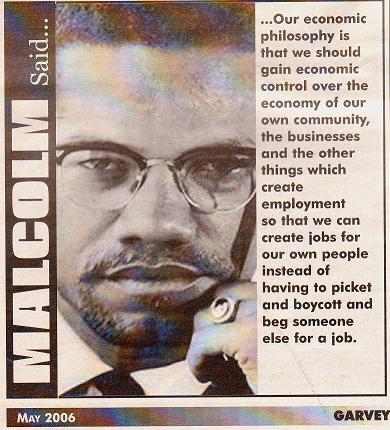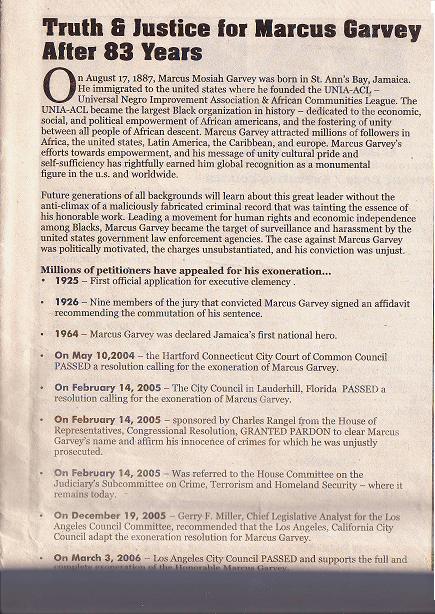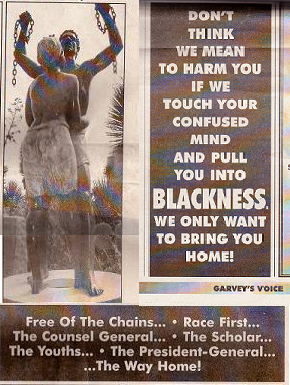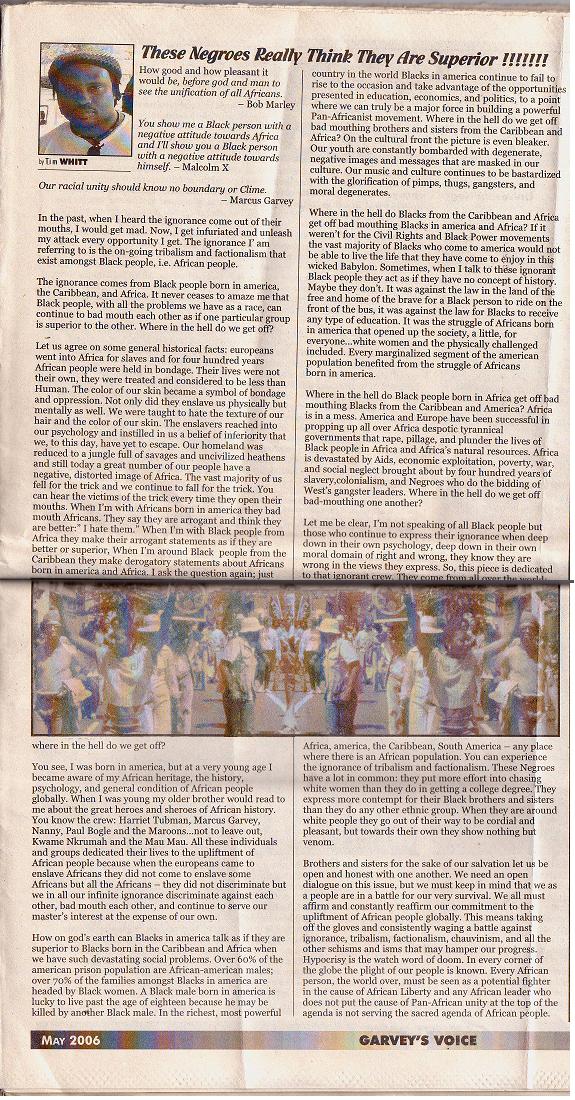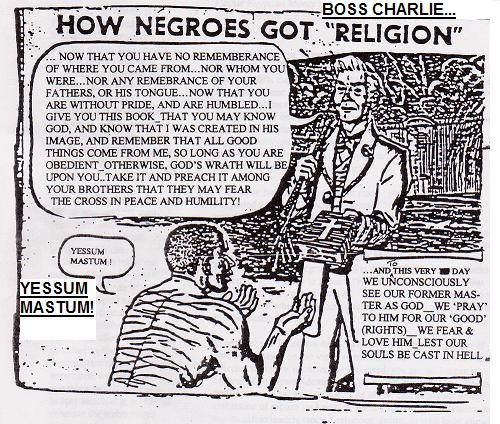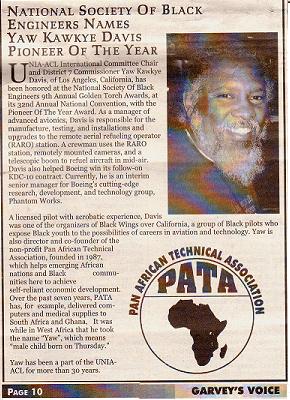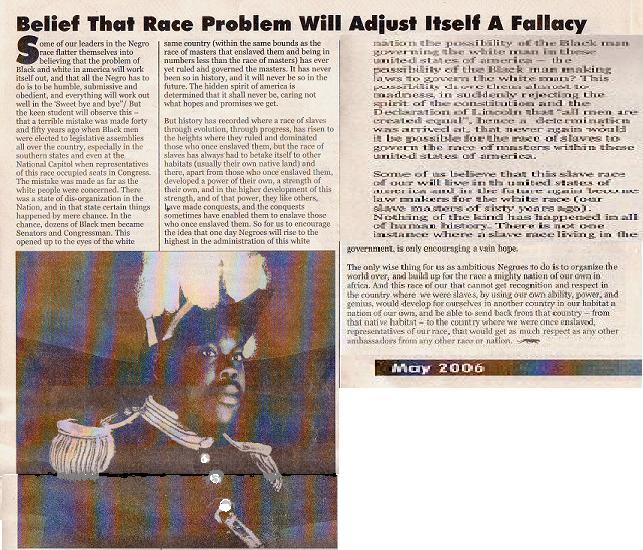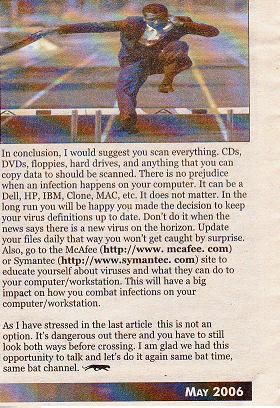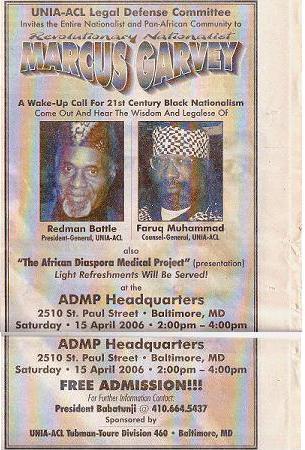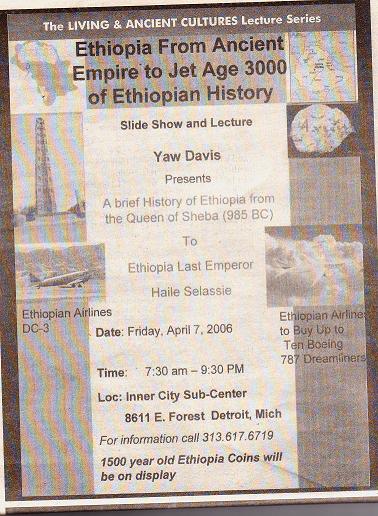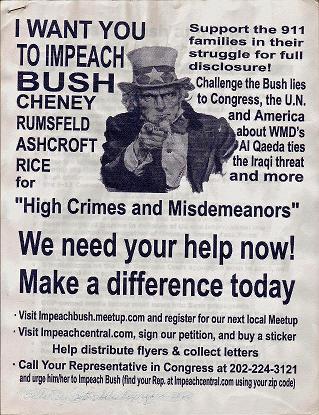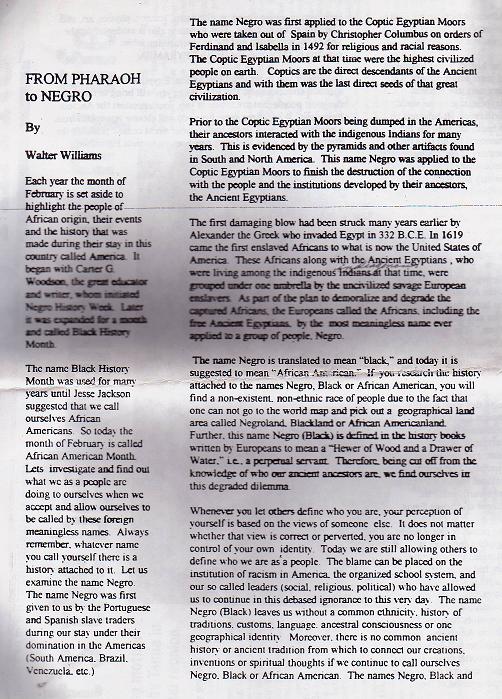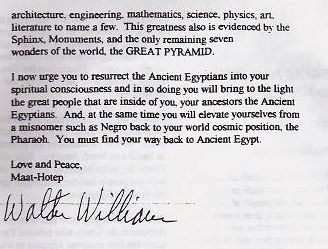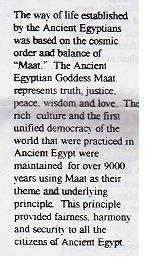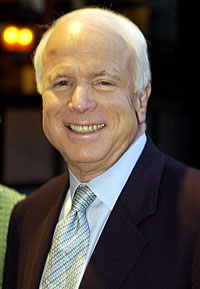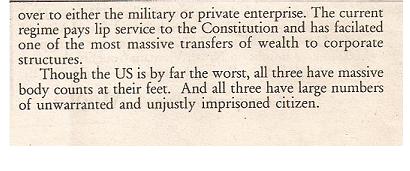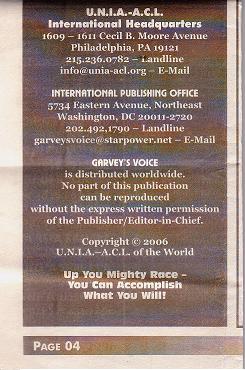New York Times
The analysis continued...
For starters, $1.2 trillion would pay for an unprecedented public health campaign — a doubling of cancer research funding, treatment for every American whose diabetes or heart disease is now going unmanaged and a global immunization campaign to save millions of children’s lives.
Combined, the cost of running those programs for a decade wouldn’t use up even half our money pot. So we could then turn to poverty and education, starting with universal preschool for every 3- and 4-year-old child across the country. The city of New Orleans could also receive a huge increase in reconstruction funds.
The final big chunk of the money could go to national security. The recommendations of the 9/11 Commission that have not been put in place — better baggage and cargo screening, stronger measures against nuclear proliferation — could be enacted. Financing for the war in Afghanistan could be increased to beat back the Taliban’s recent gains, and a peacekeeping force could put a stop to the genocide in Darfur.
All that would be one way to spend $1.2 trillion. Here would be another: The war in Iraq...
In the days before the war almost five years ago, the Pentagon estimated that it would cost about $50 billion. Democratic staff members in Congress largely agreed. Lawrence Lindsey, a White House economic adviser, was a bit more realistic, predicting that the cost could go as high as $200 billion, but President Bush fired him in part for saying so.
These estimates probably would have turned out to be too optimistic even if the war had gone well. Throughout history, people have typically underestimated the cost of war, as William Nordhaus, a Yale economist, has pointed out.
But the deteriorating situation in Iraq has caused the initial predictions to be off the mark by a scale that is difficult to fathom. The operation itself — the helicopters, the tanks, the fuel needed to run them, the combat pay for enlisted troops, the salaries of reservists and contractors, the rebuilding of Iraq — is costing more than $300 million a day, estimates Scott Wallsten, an economist in Washington.
That translates into a couple of billion dollars a week and, over the full course of the war, an eventual total of $700 billion in direct spending.
The two best-known analyses of the war’s costs agree on this figure, but they diverge from there. Linda Bilmes, at the Kennedy School of Government at Harvard, and Joseph Stiglitz, a Nobel laureate and former Clinton administration adviser, put a total price tag of more than $2 trillion on the war. They include a number of indirect costs, like the economic stimulus that the war funds would have provided if they had been spent in this country.
NOTHING IN THE WORLD IS
MORE DANGEROUS THAN
SINCERE IGNORANCE AND
CONSCIENTIOUS STUPIDITY.
~ MARTIN LUTHER KING~
>THE SPOIL
>
>As the 2008 presidential elections approach,
>perennial dark horse candidate Ralph Nader
>emerges from the shadows to decipher America’s
>next political showdown
>
>By John DeSio
>New York Press
>http://www.newyorkpress.com/20/4/news&columns/feature.cfm
>
>
>Mention the name Ralph Nader to any loyal
>Democrat and the response is likely to be a
>variation on the same theme, and always delivered
>quickly and angrily.
>
>“It’s his fault we’re in the mess we’re in now,”
>is the typical argument, uttered at almost light
>speed and often with a wild eye staring at the
>questioner. In 2000, Nader took the Green Party’s
>support in a run for president and ran a
>meaningful third-party campaign. He brought more
>liberal voters out to the polls and was such a
>factor in national opinion polls that Democrats
>openly worried that their candidate, then Vice
>President Al Gore, would suffer the consequences.
>
>The fears of those Democrats were realized in
>Florida, which saw Texas’ Republican Governor
>George W. Bush defeat Gore by just 537 votes
>statewide, an election result that ushered one of
>the greatest legal battles over politics that the
>modern world had ever seen. Despite Gore’s loss
>in court, as well as a number of other factors
>that have had Democrats screaming for the past
>six years that Bush’s political allies stole the
>election, those same Democrats often point to
>Nader’s involvement in the race as the first and
>foremost reason Gore was defeated. The Green
>Party candidate snagged 97,421 votes in Florida.
>Had Nader not run at all, the running logic holds
>that those presumably left-leaning voters would
>have switched to Gore, the more palatable of the
>two major candidates, and Bush would have never
>been president.
>
>In the aftermath of 2000, Nader’s years of
>consumer advocacy and his position as a vocal
>advocate of traditional liberal causes has become
>nearly meaningless for many Democratic Party
>members. For them, Ralph Nader is the biggest
>reason we have the Iraq War, the PATRIOT Act and
>Gitmo prisoner abuses. Every bad thing that
>President Bush has ever been accused of doing has
>been dropped at Nader’s feet. One Democratic
>elected official (who preferred to remain
>anonymous) summed up his party’s feeling towards
>Nader in three simple words: “I hate him.”
>
>An Unreasonable Man, a new documentary on Nader’s
>life and career by former staff member Henriette
>Mantel and her filmmaking partner Steve Skrovan,
>deals with all sides of the fight, interviewing
>both angry Democrats and Nader defenders alike.
>The arguments defending Nader’s 2000 campaign are
>given equal time. Gore lost both his home state
>of Tennessee and President Bill Clinton’s home
>state of Arkansas, both of which should have been
>easy pickings for the eight-year vice president.
>And Nader spent hardly any time campaigning in
>swing states like Florida. Nevertheless, Nader is
>totally unapologetic about the results in 2000.
>Gore lost because he took votes for granted, says
>Nader, and did not do a good job placating his
>traditional base.
>
>“I think the anger of the Democrats is an
>autocratic anger,” says Nader. “Basically they
>think the Democrats own a certain number of votes
>in the country and nobody should challenge them.
>Well, that’s a very autocratic form of political
>bigotry.”
>
>Determined not to allow history to repeat itself
>in 2004, Democrats spent a great deal of time,
>effort and money trying to keep Nader off the
>ballot, especially in the swing state of
>Pennsylvania, out of fear that his independent
>run might again draw votes from Massachusetts
>Senator John Kerry and play a factor in
>reelecting Bush. Kerry even had a private
>sit-down with Nader as part of the effort, though
>Nader would not agree to exit the race.
>
>Democrats are afraid of the free exchange of
>ideas, said Nader, and would rather deny voters
>their choice than answer the tough questions.
>“They’re basically not just denying the essence
>of free speech, petition and assembly, they’re
>basically saying to our voters, ‘we’re going to
>deny you the right to vote for candidates of your
>choice,’ not by competing … but by taking them
>off the ballot so you can’t vote for them,”
he >says.
>
>He will not say if he is planning a third
>straight run for the presidency in 2008, offering
>only that it is way too early for him to make
>that decision. Still, Nader is not shy when it
>comes to criticizing the Democratic Party’s
>current frontrunners.
>
>Former North Carolina Senator John Edwards is
>becoming more progressive and has a good agenda
>on poverty, but he prefers Ohio Congressman and
>2004 fringe candidate Dennis Kucinich. Illinois
>Senator Barack Obama, the current media golden
>boy of all potential candidates, is far too new
>to the political arena to even be seriously
>evaluated as a contender. But Nader saves
>particular ire for New York’s own Democratic
>candidate Senator Hillary Clinton, who made it
>official over the weekend that she would seek her
>party’s nomination.
>
>For Nader, Hillary Clinton is the problem, not
>the solution. “I think she’d be a step down from
>Bill, who is not very high to begin with,” says
>Nader.
>
>If a more liberal Democrat is to be elected
>president in 2008, Nader’s machinations in 2000
>might have set the stage for such an event. After
>failing to keep more left-leaning voters in line
>that year, prominent Democratic politicians have
>since taken to championing some of their causes
>more publicly.
>
>In the ’90s Republicans were forced to begin to
>embrace the agenda of the Christian right in
>order to keep their electoral ducks in a row.
>Today, Democrats face a similar situation with
>their more liberal voting base. They have seen
>firsthand what can happen when you assume that a
>particular voting block will stay loyal based on
>a desire to avoid electing Republicans. This
>strategy, whereby liberals vote Democrat as the
>lesser of two evils, has diminished largely
>through the actions of a motivated activist base
>drawn in by new media methods, a strategy
>designed to force the party’s elite to pay
>attention.
>
>DailyKos.com, a liberal powerhouse blog and
>online community, has gained such influence
>amongst the Democratic Party that its founder,
>Markos Moulitsas Zúniga, has become a sought
>after consultant for Democratic candidates. The
>site drove Ned Lamont’s upstart campaign against
>Connecticut Senator Joe Lieberman last year,
>providing advice, manpower and money as Lamont
>defeated Lieberman in the Democratic Party
>primary.
>
>Nader is not sold on the Internet, preferring
>more Luddite-friendly activities like town hall
>meetings and street corner rallies. Technology
>has made it easier to develop a movement, he
>explains, and activists are not taking advantage
>of that technology nearly as much as they should
>be.
>
>“This is the first generation in history that has
>essentially had a free communications system from
>themselves to the world, and that used to always
>be one of the obstacles years ago,” says Nader,
>pointing out that activists just a generation ago
>could not afford to buy newspaper ads or print
>newsletters, both necessities in furthering one’s
>political cause.
>
>Today you can start a blog for mere pennies, but
>according to Nader, much of the Internet amounts
>to little more than a high-tech spinning of the
>wheels.
>
>“Now they have basically an ‘open sesame’
>situation, and it’s not producing a more aroused
>younger generation,” says Nader, who went on to
>lament how much time on the Internet is wasted
>pursuing gossip, playing video games and updating
>a MySpace profile. “And it doesn’t do much for
>their intellect, or their sense of injustice. And
>I don’t think many people would have predicted
>that 15 years ago. They would’ve predicted
>probably just the opposite. Having this kind of
>communications system would’ve created a lot more
>social activism.”
>
>Nader claims the nation’s college campuses, at
>one point the epicenter for liberal activism in
>this country, are just as dead. Though the war in
>Iraq is on the minds of college students much
>like the Vietnam War was in the ’60s and ’70s,
>students faced a real threat of fighting in
>Vietnam due to the draft.
>
>In the film, Nader discusses how crucial these
>college activists, motivated by Vietnam and other
>causes, were when it came to pushing a
>progressive agenda. But today the military is all
>volunteer and, although many college students
>might oppose the war, they will never have to
>actually serve overseas fight in it.
>
>“If you’re part of the risk, you’re going to be
>part of the solution, most likely. The campuses
>are pretty asleep on this issue,” says Nader. On
>other issues, like global warming and even
>student loan payments, Nader sees the nation’s
>collective student body just as disinterested,
>attributing this malaise to a feeling of
>powerlessness bred into them from grade school.
>“They’re taught to obey,” said Nader.
>Edwards and Clinton might have announced their
>presidential aspirations via YouTube, but that
>does not mean they will motivate anyone to their
>side through technology alone. Nader points out
>that the United States had a much smaller
>population in the early 1800s than it does today,
>yet the rallies and marches behind social causes
>in those days were much bigger and organized
>without the benefit of technology that is taken
>for granted today. In Nader’s opinion, a
>YouTube-style candidacy is a start, but building
>a movement requires one to actually leave their
>home and physically press the flesh.
>
>“I don’t think much is going to come of it,” says
>Nader of the current hybrid of politics and
>technology. “I don’t think the electronic media
>is very motivating for people to really act. I
>think person-to-person is really the only way.
>Marches, demonstrations, living room meetings,
>when people connect human-to-human, not through
>some screen. That tends to work throughout
>history. We had greater mass movements 100 years
>ago without any telephone, automobile, anything
>like we have today.”
>
>Though he has been a major focus of liberal anger
>in the past few years, Nader spent most of his
>career fighting the right wing, starting with his
>record of fighting corporate abuses to such a
>degree that some have labeled him
>anti-capitalist. In fact, conservatives have
>charged that Nader’s “man of the people” image,
>as well as his agenda for the working class, is
>hypocritical in light of his own considerable
>personal wealth. Nader argues that such wealth is
>needed to get a movement off the ground,
>providing essential capital while other grants
>slowly roll in. He also claims that his own
>lifestyle is very frugal, and states that he has
>given the vast majority of his income, earned
>through appearance fees and speaking engagements,
>to charity over the years.
“No one else can say >that,” said Nader.
>
>He has never stood with the Right on policy
>issues, but that does not stop him from
>handicapping the 2008 Republican presidential
>primary and the chances of former New York City
>Mayor Rudolph Giuliani, who Nader says will never
>make it out of that process alive. When voters
>have a chance to really examine Giuliani, and
>when he cannot simply fall back on his
>performance in the aftermath of the terrorist
>attacks of 9/11, Nader thinks a temperamental
>Giuliani will be pushed from the spotlight.
>
>“He wasn’t a particularly good mayor in many
>ways,” says Nader, stating that the drop in crime
>Giuliani gets credit for began under Democratic
>Mayor David Dinkins and adding derisively that
>“he did clean up some of the graffiti.”
>
>Nader continues, “He was pretty low in the polls
>on Sept. 10, and he’s benefiting from what was
>basically a forceful showing up on Sept. 11 and
>afterwards. A lot of mayors would have done what
>he did. But he was in the eye of the media, and
>he’s still lunching off that. I think if he were
>to become a candidate, he’s not going to be able
>to parade his post 9/11 behavior day after day.
>He’s going to have to show up with other
>agendas.”
>
>That other agenda would reveal Giuliani to be a
>forceful right-winger with a short fuse, said
>Nader, and make him unpalatable to the many
>Democrats and independent voters who still have
>good feelings for him.
>
>Though his distaste for Senator Clinton and
>Giuliani is apparent, Nader does favor some of
>New York State’s other well-known elected
>officials. He is particularly impressed with new
>Governor Eliot Spitzer, noting that he ran his
>attorney general office in the mold of a
>corporate crusader like Nader himself. “He made
>the other attorney generals look less significant
>by what he did,” says Nader, noting that he has
>spoken to Spitzer a few times and thinks of him
>as a good public servant. “He’s made his imprint
>on corporate crime prosecution history. I hope he
>pursues that as governor.”
>
>But Nader reveals a real respect for a man who
>might be his polar opposite. While Nader worked
>as a crusader against corporate fraud and abuses,
>Mayor Michael Bloomberg was building his media
>empire from scratch and becoming just the kind of
>guy Nader might have been looking to bring down.
>But both men share a common thread. Nader was the
>major third-party presidential candidate in 2000,
>and Bloomberg is reportedly considering stepping
>into those shoes in 2008.
>
>“He’s a real cut above most Republicans,
>obviously. He’s got more of an open mind,” says
>Nader. He particularly admires Bloomberg’s strong
>stand in the face of opposition to the citywide
>smoking ban that became law in 2003. “Obviously,
>he has a pro-business leaning, and he wouldn’t be
>my progressive candidate, but I think he compares
>quite favorably with what the Republicans and
>Democrats are likely to put up … say a Hillary
>Clinton and a John McCain. He’s more of an
>independent thinker, and that’s always good in
>politics.”
>
>As far as mayoral performances go, Nader
>considers Bloomberg miles beyond his predecessor.
>“I don’t think he compares with Bloomberg,” Nader
>said of Giuliani.
>
>Whether they share the same policies or not,
>Bloomberg would be a welcome addition to the 2008
>race for Nader, who feels that only a billionaire
>like him could ever be in the position to break
>the political monopoly currently held by
>Republicans and Democrats. A lawsuit against a
>campaign like Nader’s has the potential to be
>financially crippling. Bloomberg, on the other
>hand, could simply throw money at the problem to
>make it disappear.
>
>“There’s so many billionaires now that, just
>randomly there are going to be a few progressive
>ones,” explains Nader, adding that money would
>bring credibility to the candidates and that the
>$200 million it might cost to run a campaign
>would be “chump change for them.” “That’s what
>we’re going to see on the horizon, and not just
>at the presidential level,” adds Nader. “And when
>you have that kind of money, you can break
>through.”
>
>For the Democratic Party to be successful in
>2008, Nader advises that they review his agenda
>from the 2004 election and find a credible
>candidate to adopt it. Nader presented copies of
>the agenda to the Kerry and Bush campaigns in
>2004, though he was not satisfied with Kerry’s
>lack of enthusiasm for the product. It includes
>liberal and populist red meat like progressive
>tax reform, universal health care, public works
>job creation and campaign finance reform. Right
>now, Nader does not anticipate any of the major
>Democrats embracing his ideas, preferring instead
>to run their campaigns based on “Clintonian
>rhetoric.” “We know what has to be done, but when
>greed rules it doesn’t get done,” says Nader.
>
>In the film, talk-show host Phil Donahue opines
>that Nader, for all the work he has done, for all
>the laws that have been passed due to his work,
>will only be remembered for his role in the 2000
>election.
>
>Nader himself hopes that 100 years from now, the
>public will remember him as a man that motivated
>people to action, who drove individuals to commit
>to civic activity and to protect the vitality of
>democracy.
>
>Nader adds, “Without that, things are gonna get
>worse.”
>
>
>Editor's Note:
>
>Markos Moulitsas Zúniga asserts that he was a
>political consultant only for the year 2003 and
>has done no other political consulting since. He
>currently blogs at: http://www.DailyKos.comNEW YORK PRESSThe New York Press is the conservative alternative weekly to the Village Voice in New York. please go to this link:
http://www.newyorkpress.com/20/4/news&columns/feature.cfm
To see the article about Ralph Nader.Mr. Ralph Nader's movie opens Friday, Feb. 9th at the Nuart with a question & answer with him and the filmakers at the 4:55 PM and 7:15 PM showings. www.anunreasonableman.com It will play for one week in Los Angeles & Pasadena. Please help get the word out. If the numbers are big, IFC will distribute it widely to other theaters and cities. If you are interested in phone banking let me know. Matt Zawisky, the advance man traveling with Ralph is coordinating that with Alfonso Acosta.From: Lynda Hernandez <redwoodsforever@verizon.net>
To: gpoc_discuss@yahoogroups.com
Date: Wed, 31 Jan 2007 15:41:45 -0600 (CST)
***The only local Activist News Calender in LA with plenty of circulation.CONTACT jOHN jOHNSON AT:
818-982-1412
http://www.change-links.org
e-MAIL: CHANGE@PACBELL.NET
OR AT: CHANGE-LINKS@CHANGE-LINKS.ORG
Economix
What $1.2 Trillion Can Buy
Sign In to E-Mail or Save This
Print
Reprints
Share
Digg
Facebook
Newsvine
Permalink
By DAVID LEONHARDT
Published: January 17, 2007
The human mind isn’t very well equipped to make sense of a figure like $1.2 trillion. We don’t deal with a trillion of anything in our daily lives, and so when we come across such a big number, it is hard to distinguish it from any other big number. Millions, billions, a trillion — they all start to sound the same.
Skip to next paragraph
Multimedia
Graphic
Putting the Annual Cost of War in Perspective
Related
Reader Responses (January 17, 2007)
More on the Economics of the Iraq War:
The analysis by Scott Wallsten and Katrina Kosec is available here. Since it was published, they have increased some of their cost estimates.
The analysis by Linda Bilmes and Joseph Stiglitz appeared in the Milken Institute Review and is available here.
Likewise, some of their cost estimates — like those covering health care and disability payments for veterans — have risen since the article appeared.
At the outset of the war, William Nordhaus, an economist at Yale, wrote an essay examining why countries typically underestimate the cost of wars.
The 9/11 Commission
"War With Iraq: Costs, Consequences, and Alternatives" (pdf)
Scott Wallsten's Web Site
Linda Bilmes's Web Site
Joseph Stiglitz's Web Site
Article From "The Milken Institute Review" by Bilmes and Stiglitz (pdf)
"Soldiers Returning from Iraq and Afghanistan: The Long-term Costs of Providing Veterans Medical Care and Disability Benefits" by Linda Bilmes
"Struggling Back From War's Once-Deadly Wounds" (Jan. 22, 2006)
The Nation's Investment in Cancer Research
The way to come to grips with $1.2 trillion is to forget about the number itself and think instead about what you could buy with the money. When you do that, a trillion stops sounding anything like millions or billions.
The analysis continued...
Mr. Wallsten, who worked with Katrina Kosec, another economist, argues for a figure closer to $1 trillion in today’s dollars. My own estimate falls on the conservative side, largely because it focuses on the actual money that Americans would have been able to spend in the absence of a war. I didn’t even attempt to put a monetary value on the more than 3,000 American deaths in the war.
Besides the direct military spending, I’m including the gas tax that the war has effectively imposed on American families (to the benefit of oil-producing countries like Iran, Russia and Saudi Arabia). At the start of 2003, a barrel of oil was selling for $30. Since then, the average price has been about $50. Attributing even $5 of this difference to the conflict adds another $150 billion to the war’s price tag, Ms. Bilmes and Mr. Stiglitz say.
cost — might cost somewhat less. Universal preschool would be $35 billion. In Afghanistan, $10 billion could make a real difference. At the National Cancer Institute, annual budget is about $6 billion.
“This war has skewed our thinking about resources,” said Mr. Wallsten, a senior fellow at the Progress and Freedom Foundation, a conservative-leaning research group. “In the context of the war, $20 billion is nothing.”
As it happens, $20 billion is not a bad ballpark estimate for the added cost of Mr. Bush’s planned surge in troops. By itself, of course, that price tag doesn’t mean the surge is a bad idea. If it offers the best chance to stabilize Iraq, then it may well be the right option.
But the standard shouldn’t simply be whether a surge is better than the most popular alternative — a far-less-expensive political strategy that includes getting tough with the Iraqi government. The standard should be whether the surge would be better than the political strategy plus whatever else might be accomplished with the $20 billion.
This time, it would be nice to have that discussion before the troops reach Iraq.
leonhardt@nytimes.com
The war has also guaranteed some big future expenses. Replacing the hardware used in Iraq and otherwise getting the United States military back into its prewar fighting shape could cost $100 billion. And if this war’s veterans receive disability payments and medical care at the same rate as veterans of the first gulf war, their health costs will add up to $250 billion. If the disability rate matches Vietnam’s, the number climbs higher. Either way, Ms. Bilmes says, “It’s like a miniature Medicare.”
In economic terms, you can think of these medical costs as the difference between how productive the soldiers would have been as, say, computer programmers or firefighters and how productive they will be as wounded veterans. In human terms, you can think of soldiers like Jason Poole, a young corporal profiled in The New York Times last year. Before the war, he had planned to be a teacher. After being hit by a roadside bomb in 2004, he spent hundreds of hours learning to walk and talk again, and he now splits his time between a community college and a hospital in Northern California.
Whatever number you use for the war’s total cost, it will tower over costs that normally seem prohibitive. Right now, including everything, the war is costing about $200 billion a year.
Treating heart disease and diabetes, by contrast, would probably cost about $50 billion a year. The remaining 9/11 Commission recommendations — held up in Congress partly because of theirThanks everyone for your comments. Apparently the Ralph haters haven’t found us yet so let’s cherish this time together! Opening week in NYC as been great. We have had pretty good crowds Thursday and Friday after our opening night was sold out for 3 shows! The usual arguments during the Q and A ensue but I have to say my favorite Q and A was yesterday when we had about 40 film/political science students from City College and NYU attended. Also mixed into that crowd were Senior Citizens. It gave me faith in the Youth and the Seniors of America. Not so much that they love or hate Ralph but that several of them said they felt inspired to get out become involved in everything from community social work to civic work right in the neighborhood of the theater. So that was nice.Please listen to Amy Goodman on Democracy Now on Monday morning (Feb. 5). Ralph and I will be on.
Thanks and I will check in again as soon as I come up for breath from this opening week-end!! I’m bugging Steve to come say hi too, so I’m sure he will be here any minute. THANKS and tell your friends to come see AN UNREASONABLE MAN!!!! Bye, Henriette
And his new book "The Seventeen Traditions"His new book "The Seventeen Traditions"Mr. Ralph Nader's movie opens Friday, Feb. 9th at the Nuart with a question & answer with him and the filmakers at the 4:55 PM and 7:15 PM showings. www.anunreasonableman.com It will play for one week in Los Angeles & Pasadena. Please help get the word out. If the numbers are big, IFC will distribute it widely to other theaters and cities. If you are interested in phone banking let me know. Matt Zawisky, the advance man traveling with Ralph is coordinating that with Alfonso Acosta.Bella De Soto in protest-addressing a San Pedro Port Trucker gathering at a Port power point presentation on the benefits of a the 8/01/05 so called "Peer Pass" port initiative to open/operate both, the Long Beach/San Pedro Ports into a 24/7 around the clock operation structure, which would undermine both, the nearby port Cities-environment, and the life's on thousands of Truckers in/out of these ports daily!!!
This Peer-Pass City policy was pushed furiously by then newly elected Mayor Antonio Villaraigosa and City Council Member-15 District Janice Hahn, while opposed by many who understand the long term negative impacts...Ralph Nader will be on KPFK this Thursday Feb 8th at 5PM
discussing his new film An Unreasonable Man and his new book The Seventeen Traditions.
From: Lynda Hernandez <redwoodsforever@verizon.net>
To: gpoc_discuss@yahoogroups.com
Date: Wed, 31 Jan 2007 15:41:45 -0600 (CST)
http://members.pdxweb.net/justicevision/
Just submit you info and Justice Vision does the rest to rush your video selections...JusticeVision
Order Form :
DU number or brief description :
of Tape(s) you would like sent:
First Name:
Last Name:
Street Address:
Street Address 2:
City:
State:
ZipCode:
Telephone:
E-Mail Address:
http://justicevision.blogspot.com/Democracy Digest Volume 89: 9/11 and the Neo-Con Agenda -- Facing the Facts (on 3 DVDs)
Link to This | Online Order Form at: http://justicevision.blogspot.com/2006/07/democracy-digest-volume-89-911-and-neo.html
Recent Items
Democracy Digest Volume 89: 9/11 and the Neo-Con A...
Democracy Digest Volumes 78-88
Democracy Digest Volumes 75-77: Larry Teeter, Geor...
Democracy Digest Volumes 69-74: Iraq, Wal-Mart, th...
DVDs: Chomsky, Franken, Parenti, Krugman and more;...
DVD sets: San Francisco & New York 9-11 Inquiries,...
DVDs: Democracy Digest 64-68, Gary Webb, Encuentro...
DVDs: Helen Caldicott, Arianna Huffington, Chalmer...
Democracy University Special Edition: Fellowship o...
The 2004 Unitarian Universalist General Assembly (...
American Scholars Symposium
9/11 and the Neo-Con Agenda: Facing the Facts
Los Angeles Sheraton, 6/24-25/2006
Click here for more information
(When ordering, ask for "DD89" to request all 3 discs or specify discs desired)
A higher-quality 4-DVD version of this set is also available. This set includes no additional content but is recorded with a higher picture quality than the 3-DVD set. To request the 4-disc set, ask for "DD89.4-7" when ordering.
*****
NOTE TO SUBSCRIBERS: The current subscriber mailing consists of Democracy Digest Volumes 78 through 88 and the 3-DVD version of DD89. If you'd like to upgrade to the 4-DVD version of DD89 -- or receive less than the full mailing -- or if your address has changed, please let us know as soon as possible, as these are now being shipped.DEMOCRACY UNIVERSITY-JUSTICE VISION VIDEO SALE DIRECTORYDemocracy Digest Volumes 78 through 88
http://justicevision.blogspot.com/2006/07/democracy-digest-volumes-78-88.html
SOME FAVORITE LISTS...SOME FAVORITE LISTS...http://www.anunreasonableman.com/calendar.cfmDec 13, 2006 Click here for 2007 opening dates at a theatre near you!
Aug 29, 2006 IDA's Eight City Roll Out!
Aug 03, 2006 Upcoming Screenings - Docuweek Los Angeles!
Mar 18, 2006 An Unreasonable Man screening at Hot Docs Canadian International Documentary Festival!
Jan 06, 2006 An Unreasonable Man at the Sundance Film Festival 2006!
Prior to the
US Constitution,
its Governmental
system had
embarked on
Imperialist
Global
Colonization
by so called
civilizing Savages...
The entire World
is Savage to any
Imperialism, or else
its arrogant superiority can't endure!©Ashley Montague The Dictionary of UU Biography is a resource of online biographies of Unitarians ... Unitarian Universalist Women's Heritage Society ...
www.uua.org ©Index of /uuhs/duub/articles ... html 29-Dec-2005 14:17 203 ashleymontague.html 29-Dec-2005 14:17 213 assigned. ... Apache/2.0.46 (Red Hat)
Server at www.uua.org Port 80 ... www.uua.org ©Ashley montague ... Ashleymontague ... the text of the AshleyMontague Resolution to End the Genital ... htppashleymontague httashleymontague http//ashleymontague http ...
xoomer.alice.it The Book "The Natural Superiority" by MD/Anthropologist Ashley Montague,
now deceased 10 years. This book dispels the fact of Women Intellectual superiority
over Men... Mrs. Montague's intensive studies and analysis led her to exposing a
critical global challenged truth held by females.
There, I see the separation of Men & Women
through religions as a political Imperialist strategy...
In order to silent the female global population
into complete submission, while reduced to just
a birthing machine without even human rights!
That most global Women have no property rights
is indicative of the intended fascist strategy.
I continue to expose this fact unrelenting because
the male energy is never complete without its
counterpart the female! Equally, the same hold true
for the female gender.
The Unitarian Universalist Dictionary of Biography is an entirely volunteer-run organization, and we need the help of interested researchers and writers to complete the project. Thank you for your interest. http://www.uua.org/uuhs/duub/articles/ashleymontague.htmlTop Links: ashley montague http://stewo.info/results/ashley%20montague.html
--------------------------------------------------
1. Find Montague Alumni At Reunion.com!
Searching for old classmates, lost friends or family? Reunion.com can help you re-connect with your past and stay connected. Sign up now, its free.
2. Who's Searching for You?
Ashley Montague: Find Out Here - It's Quick And Easy
3. Find ashley montague
Shop and compare great deals on ashley montague and other related products at MonsterMarketplace.
4. Find Montague Alumni At Reunion.com!
Searching for old classmates, lost friends or family? Reunion.com can help you re-connect with your past and stay connected. Sign up now, its free.
5. Information about Ashley Montague
Ashley Montagu, was an English anthropologist and humanist who chose to direct his numerous published studies on the significant relationship of mother and infant to the general public.
6. Look for ashley montague on eBay
Search eBay for ashley montague. Bid on auctions or use Buy it Now to purchase items from customer-rated sellers.
7. Montague In the Free Online Encyclopedia
Check Free Online Encyclopedia for information about Montague
8. ashley+montague
Here are the top sites for ashley+montague!
9. Adult Dating and Chat Rooms - 18+ Only
Meet Hot and Horny Singles In your area. Find the best adult dating site for you!
10. Find ashley+montague
The most popular sites for ashley+montague!
11. Credit Counseling vs. Debt Consolidation?
Free Report plus 1000's of other reports on credit, health, wealth, refinance, online business etc... It could cost you hundreds. Why pay for information we give away for free?
12. Adult Chat Rooms - Meet Sinlges For Free - US Only
Online Singles Chat Rooms. Meet Singles in your area for free. Flirt, Chat and meet singles for free. US ONLY and over 18
13. 100% Free Online Dating
No Credit Card Required! Free e-mail, chat and flirt with local Singles - must be 18+
14. Information about Ashley Montague
Ashley Montagu, was an English anthropologist and humanist who chose to direct his numerous published studies on the significant relationship of mother and infant to the general public.
15. Travelocity.com Coupons / Promotions: Travel Deals
RedtagDeals.com lists free promotional codes from Travelocity to save more money on already hot travel deals at Travelocity Hotels, Air, Car Rentals. Cruises, Last Minute Getaways etc. Also find 20,000+ other Free Coupons at RedtagDeals.com!
16. Acne Resource: Links To The Most Helpful Sites
Don't suffer, prevent lasting damage. Acne care review.
Here only the qualitative and full information.
We know all about it. It is one of the best a resource about ashley montague
Mr. W. E. B. DuBois
Said "There can be no perfect Democracy curtaild by color, race or poverty. But with all we acomplish all, even peace."DEMOCRACY UNIVERSITY-JUSTICE VISION VIDEO SALE DIRECTORY<!--
<>>>>>>>>>>>>>>>>>>>>>>>>>>>>>>>>>>>>>>>>>
Page 3China, Africa sign $1.9B in trade deals
Posted 11/5/2006 1:23 PM ET E-mail | Save | Print | Subscribe to stories like this...
A man walks past a poster promoting the upcoming China-Africa Summit in Beijing. The two-day summit, with the theme of friendship, peace, cooperation and development will open on November 4.
BEIJING (AP) — China and Africa ended an unprecedented summit Sunday, signing deals worth $1.9 billion and pledging to boost trade and development between the world's fastest-growing economy and its poorest continent.
PROFILE: China's hunger for resources has pros, cons
Chinese President Hu Jintao already had pledged billions of dollars in aid and loans to Africa during the two-day meeting, part of Beijing's efforts to strengthen ties to Africa amid China's search for new oil sources and export markets.
In a declaration read at the end of the Forum on China-Africa Cooperation, China and 48 African nations pledged a partnership based on "political equality and mutual trust, economic win-win cooperation and cultural exchanges."
"We hold that the world today is undergoing complex and profound changes, and that the pursuit of peace, development and cooperation has become the trend of the times," Hu said after the biggest diplomatic meeting ever in China.
The event included heads of state from 35 of the 53 African nations, and top officials from 13 others.
"In a new era, China and Africa have common development goals and converging interests which offer a broad prospect for cooperation," Ethiopian Prime Minister Meles Zenawi said in reading out part of the declaration.
"We hold that the establishment of a new type of strategic partnership is both the shared desire and independent choice of China and Africa, serves our common interests and will help enhance solidarity and mutual support and assistance," Egyptian President Hosni Mubarak said.
The declaration also called on developed nations to increase their help to Africa.
"We urge the developed countries to increase official development assistance and honor their commitments to opening markets and debt relief," the Ethiopian leader said.
The increased assistance from the developed world would include greater financial and technical help to boost Africa's capacity to fight poverty and disasters, and realize its U.N. Millennium Development Goals.
The declaration also called for a bigger role for Africa in the United Nations.
"Priority should be given to increasing the representation and full participation of African countries in the U.N. Security Council and other U.N. agencies," it said.
China and Africa had shown their economic potential earlier Sunday by signing more than a dozen trade deals worth $1.9 billion, while a Chinese company announced a $8.3 billion contract to build a railway in Nigeria.
Chinese companies signed 14 agreements with African governments and companies at the conclusion of a conference of Chinese and African entrepreneurs in Beijing, the official Xinhua News Agency said.
The deals cover infrastructure, resources, construction, telecommunications and finance, Xinhua said.
Separately, China Civil Engineering Construction Corp. said it signed a deal on Oct. 30 with Nigeria's transport ministry to build a railway in the West African country, the continent's largest oil producer.
The 817-mile railway will link the southern city of Lagos with Kano in the north. It would be China's largest overseas engineering project by value, the company said on its website on Saturday.
Hu on Saturday pledged to double China's aid to Africa from its 2006 level by 2009. He promised $3 billion in loans, $2 billion in export credits and a $5 billion fund to encourage Chinese investment in Africa.
It was not clear if the government's promised $5 billion investment fund played a role in the deals announced Sunday.
African leaders at the meeting said they welcomed Chinese investment and business ties, but Beijing also faced criticism that it is treating Africa like a colonial territory and supports African regimes with poor human rights records.
"Chinese assistance to Africa is sincere, unselfish and has no strings attached," Premier Wen Jiabao said at a gathering of Chinese and African entrepreneurs held as part of the conference.
African nations also said in the declaration that they were committed to a "one-China" policy and opposed Taiwan independence. China and Taiwan split amid civil war in 1949. Beijing considers the self-governing island to be Chinese territory.
China's trade with Africa soared to $39.7 billion last year, four times its 2000 level, according to Wen. He called for efforts to boost that to $100 billion by 2020, and promised to open China's markets wider to African exports.
China's state oil companies are expanding in Africa, signing deals in Nigeria, Angola, Sudan and elsewhere. Manufacturers are trying to expand exports to African markets.
Human rights activists accuse China of supporting governments such as those in Sudan and Zimbabwe that are accused of chronic abuses. African business groups complain about poor treatment by Chinese companies and competition from a flood of low-cost imports.
Copyright 2006 The Associated Press. All rights reserved. This material may not be published, broadcast, rewritten or redistributed.
By Jason Lee, ReutersPROFILE: China's hunger for resources has pros, cons
Chavez re-elected by
large margin 12-03-2006
Updated 12/3/2006
10:18 PM ET E-mail
| Save | Print |
Subscribe to stories like this
Enlarge By Howard Yanes, AP
Venezuelan President Hugo Chavez waves to supporters after he voted at a polling station in Caracas, Venezuela, today.
CARACAS, Venezuela (AP) — President Hugo Chavez won re-election by a wide margin Sunday, according to official results, giving him another six years to solidify his self-styled social revolution and further his global crusade against U.S. influence.
With 78% of voting stations reporting, Chavez had 61% to 38% for challenger Manuel Rosales, said Tibisay Lucena, head of the country's elections council.
Chavez had nearly 6 million votes versus 3.7 million for Rosales. Turnout was 62%, according to an official bulletin, making the lead insurmountable.
Minutes after the results were announced, Chavez appeared on the balcony of the presidential palace singing the national anthem.
"Long live the socialist revolution! Destiny has been written," Chavez shouted with abandon to thousands of flag-waving supporters under a pouring rain.
Chavez said he would try now to deepen a revolution that has spread Venezuela's oil wealth among the country's poor.
"No one should fear socialism," Chavez proclaimed. "Socialism is human. Socialism is love."
Even before polls closed, Chavez supporters celebrated in the streets, setting off fireworks and cruising the capital of Caracas honking horns and shouting "Chavez isn't going anywhere!"
A top Rosales adviser, Teodoro Petkoff, said early Sunday evening that the voting "was carried out in a satisfactory manner." He said some irregularities had occurred but most were resolved. Another member of the Rosales camp had accused pro-Chavez soldiers of reopening closed polling stations and busing voters to them.
The vote was monitored by observers from the European Union, the Carter Center and the Organization of American States.
Since he first won office in 1998, Chavez has increasingly dominated all branches of government and his allies now control congress, state offices and the judiciary. He has called U.S. President George W. Bush the devil, allied himself with Iran and influenced elections across the region.
Chavez also has used Venezuela's oil wealth to his political advantage. He has channeled oil profits toward multibillion-dollar programs for the poor including subsidized food, free university education and cash benefits for single mothers. He has helped allies from Cuba to Bolivia with oil and petrodollars.
Rosales, a cattle rancher and governor of western Zulia state who stepped down temporarily to run against Chavez, has rebuilt the opposition from its referendum defeat.
During the campaign, Rosales accused Chavez of edging Venezuela toward one-man rule. He focused on issues such as rampant crime and corruption, widely seen as Chavez's main vulnerabilities.
Chavez supporters jarred voters awake hours before dawn in Caracas with recordings of reveille blaring from truck-mounted loudspeakers.
"We're here to support our president, who has helped us so much," said Jose Domingo Izaguirre, a factory worker who waited hours to vote. His family recently moved into new government housing.
Rosales supporters accused Chavez of deepening class divisions with searing rhetoric demonizing his opponents.
Alicia Primera, a 54-year-old housewife, was among voters so passionate about the choice that they camped out overnight in voting queues.
"I voted for Chavez previously. I cried for him," Primera said. "Now I'm crying for him to leave. He's sown a lot of hate with his verbiage."
The campaign was hostile, with Chavez calling Rosales a pawn of Washington and Rosales saying he was on the alert for fraud. Rosales' campaign had endorsed the electronic voting system as trustworthy — as long as no attempts were made to thwart it.
More than 125,000 soldiers and reservists were deployed to safeguard the balloting.
In Washington, State Department spokeswoman Janelle Hironimus stressed "the importance of a free, fair and transparent process."
Conflict and ambition have marked the rise of Chavez, 52, from a boy selling homemade sweets in a dusty backwater to a failed coup commander in 1992 and now a leader who could set the tone of Latin American politics for years to come.
Constitutional reforms he oversaw in 1999 triggered new elections the following year that he easily won. Loyalists helped him survive a 2002 coup, a subsequent general strike and a 2004 recall referendum.
Chavez says he would convene a commission upon re-election to propose constitutional reforms, likely including an end to presidential term limits. Current law prevents him from running again in 2012.
Some Rosales supporters worry that a re-elected Chavez would turn more radical. Chavez insists he is a democrat and will continue to respect private property — though he has boosted state control over the oil industry and has said he might nationalize utilities. Venezuela is the world's fifth largest oil exporter and soaring oil prices have made it South America's fastest growing economy.
Chavez has pledged at least US$1.1 billion (euro830 million) in loans and financial aid to Latin American countries in the past two years, and billions more in bond bailouts for friendly governments as well as generously financed oil deals. But the largesse has proved a weakness at home, with polls suggesting many Venezuelans believe the aid impedes efforts to address the country's own problems.
Chavez, who says Fidel Castro is like a father to him, has built increasingly close ties with Cuba, sending the island oil while thousands of Cuban doctors treat Venezuela's poor for free.
Copyright 2006 The Associated Press. All rights reserved. This material may not be published, broadcast, rewritten or redistributed.
Posted 12/3/2006 1:02 PM ET
Updated 12/3/2006 10:18 PM ET
ALWAYS AGAINST THE TIE...
NOT EASY WHEN THE DEMOCRATIC PARTY MAINTAINS PERPETUAL SHACKLES ON A NAIVE POPULOUS, WHO CONTINUES VOTING AGAINST THEIR INTEREST EVERY TIME THEY VOTE FOR DEMOCRATS...
"If all Americans would shift their energies from sports to politics, then we would not be in mess we're in now..." RALPH NADER
IF THE FEW US Congressmembers Like: Dennis Kucinich / Barbara Lee & Cynthia McKinney WOULD DO THE RIGHT THING AND JOIN Berney Sanders-INDEPENDENT, VT. Just won seat in THE US SENATE TO REPLACE long time SEAT HELD BY A FORMER REPUBLICAN SENATOR, JIM JEFFORDS, WHO, BAILED OUT AND BECAME an INDEPENDENT WHEN THE REPUBLICAN PARTY TOOK OVER THE HOUSE/SENATE IN 2000, AND BEGAN PUSHING DRACONIAN LAWS...
So who is owed all the respect and thanks for always exposing NOT JUST the Liberal intelligencia in the US, but of course, the ruthless ways of the conservatives (but mostly all Neo-Cons)????
RALPH NADER THAT'S WHO!!!!!!!!!!!
HOW DARE ANYONE EVEN SPEAK OF MR. RALPH NADER IN THE SAME BREATH OF Democrats/Liberals!!! Who is Emperialist? Liberal Democrats that's who! Who is Emperialist? Conservatives that's who! Who is Emperialist/Fascist? Neo-Cons That's who!
Ingnorance kills... Wake up all, is a new dawn!
Why did the democratic Party invested so much money to sue Mr. Ralph Nader in olmost every State of the union, to of course prevent him any possible edge ????
Why did they? More shameful still, the so called "legal Liberty Unions for Social defense" all, declined to assist him and his team, TO FIGHT BACK THE POWERFUL DEMOCRATIC MACHINE, so who could he get help from but from some Republicans with a heart....
Of course, this was most ideal for the Democratic Party to also use in their insistent false propaganda against Mr. Ralph Nader!
Bella
RALPH NADER THAT'S WHO!!nadercamejo-announce mailing list: nadercamejo-announce@lists.votenader.org Sign The Petition to Impeach at: http://pledgetoimpeach.org/signpledgetoimpeach.html
Please copy/paste into your Browser the above link...
"THE WORLD CAN'T WAIT ANY LONGER" PLEASE JOIN US FOR OUR TEACH-IN HOW TO THIS SUNDAY 2pm AT: 1284 W. SUNSET BLVD., ECHO PARK
SIGN THE PLEDGE IT IS URGENT!
FORCE CONGRESS TO IMPEACH GEORGE BUSH!WE THE PEOPLE'S PLEDGE TO SUPPORT A BILL TO IMPEACH PRESIDENT GEORGE W. BUSH, VICE-PRESIDENT DICK
CHENEY, AND SECRETARY OF DEFENCE DONALD RUMSFELD. (One pledge per person)
I hereby solemnly swear to support a bill to impeach George W. Bush, and Vice-President Dick Cheney for crimes against the U.S. Constitution and International law. Should Congress fail to pass the bill, thereby forcing the Representative introducing the bill to "call in the pledges", I swear to stay home from work, refrain from any unnecessary purchases, and remain in my home until the bill is passed. I do this in keeping with my duty as a citizen of the United States of America and consistent with the powers reserved to The People by the 10th Amendment of the U.S. Constitution.
Once you have signed your pledge be sure to direct
others who also support impeachment to the site to add
their pledge to those that will be present on the floor of
the House when the bill to impeach is introduced.
CONTACT US at: admin@pledgetoimpeach.org
I Pledge!Please get Dr. Walter Williams' book and DVD by calling... Bare with me, I have been trying to reach him, but it has been difficult to date, but when I do, I will pass on the info to you. This material urgent and most critical for the searching the real World History Truth...MOST POPULAR
E-Mailed Blogged Searched Economix: What $1.2 Trillion Can Buy
http://nytimes.com/Thursday, January 18, 2007 Last Update: 3:33 AM ET1.BUSINESSJanuary 17, 2007
Economix: What $1.2 Trillion Can Buy
By DAVID LEONHARDT
Medical research, tackling poverty and education, and reconstruction of New Orleans would all be ways to spend $1.2 trillion. Here’s another: The war in Iraq.
MOST POPULARGo to Complete List »The analysis continued...
For starters, $1.2 trillion would pay for an unprecedented public health campaign — a doubling of cancer research funding, treatment for every American whose diabetes or heart disease is now going unmanaged and a global immunization campaign to save millions of children’s lives.
Combined, the cost of running those programs for a decade wouldn’t use up even half our money pot. So we could then turn to poverty and education, starting with universal preschool for every 3- and 4-year-old child across the country. The city of New Orleans could also receive a huge increase in reconstruction funds.
The final big chunk of the money could go to national security. The recommendations of the 9/11 Commission that have not been put in place — better baggage and cargo screening, stronger measures against nuclear proliferation — could be enacted. Financing for the war in Afghanistan could be increased to beat back the Taliban’s recent gains, and a peacekeeping force could put a stop to the genocide in Darfur.
All that would be one way to spend $1.2 trillion. Here would be another:
The war in Iraq.
In the days before the war almost five years ago, the Pentagon estimated that it would cost about $50 billion. Democratic staff members in Congress largely agreed. Lawrence Lindsey, a White House economic adviser, was a bit more realistic, predicting that the cost could go as high as $200 billion, but President Bush fired him in part for saying so.
These estimates probably would have turned out to be too optimistic even if the war had gone well. Throughout history, people have typically underestimated the cost of war, as William Nordhaus, a Yale economist, has pointed out.
But the deteriorating situation in Iraq has caused the initial predictions to be off the mark by a scale that is difficult to fathom. The operation itself — the helicopters, the tanks, the fuel needed to run them, the combat pay for enlisted troops, the salaries of reservists and contractors, the rebuilding of Iraq — is costing more than $300 million a day, estimates Scott Wallsten, an economist in Washington.
That translates into a couple of billion dollars a week and, over the full course of the war, an eventual total of $700 billion in direct spending.
The two best-known analyses of the war’s costs agree on this figure, but they diverge from there. Linda Bilmes, at the Kennedy School of Government at Harvard, and Joseph Stiglitz, a Nobel laureate and former Clinton administration adviser, put a total price tag of more than $2 trillion on the war. They include a number of indirect costs, like the economic stimulus that the war funds would have provided if they had been spent in this country.
NOTHING IN THE WORLD IS
MORE DANGEROUS THAN
SINCERE IGNORANCE AND
CONSCIENTIOUS STUPIDITY.
~ MARTIN LUTHER KING~
>THE SPOIL
>
>As the 2008 presidential elections approach,
>perennial dark horse candidate Ralph Nader
>emerges from the shadows to decipher America’s
>next political showdown
>
>By John DeSio
>New York Press
>http://www.newyorkpress.com/20/4/news&columns/feature.cfm
>
>
>Mention the name Ralph Nader to any loyal
>Democrat and the response is likely to be a
>variation on the same theme, and always delivered
>quickly and angrily.
>
>“It’s his fault we’re in the mess we’re in now,”
>is the typical argument, uttered at almost light
>speed and often with a wild eye staring at the
>questioner. In 2000, Nader took the Green Party’s
>support in a run for president and ran a
>meaningful third-party campaign. He brought more
>liberal voters out to the polls and was such a
>factor in national opinion polls that Democrats
>openly worried that their candidate, then Vice
>President Al Gore, would suffer the consequences.
>
>The fears of those Democrats were realized in
>Florida, which saw Texas’ Republican Governor
>George W. Bush defeat Gore by just 537 votes
>statewide, an election result that ushered one of
>the greatest legal battles over politics that the
>modern world had ever seen. Despite Gore’s loss
>in court, as well as a number of other factors
>that have had Democrats screaming for the past
>six years that Bush’s political allies stole the
>election, those same Democrats often point to
>Nader’s involvement in the race as the first and
>foremost reason Gore was defeated. The Green
>Party candidate snagged 97,421 votes in Florida.
>Had Nader not run at all, the running logic holds
>that those presumably left-leaning voters would
>have switched to Gore, the more palatable of the
>two major candidates, and Bush would have never
>been president.
>
>In the aftermath of 2000, Nader’s years of
>consumer advocacy and his position as a vocal
>advocate of traditional liberal causes has become
>nearly meaningless for many Democratic Party
>members. For them, Ralph Nader is the biggest
>reason we have the Iraq War, the PATRIOT Act and
>Gitmo prisoner abuses. Every bad thing that
>President Bush has ever been accused of doing has
>been dropped at Nader’s feet. One Democratic
>elected official (who preferred to remain
>anonymous) summed up his party’s feeling towards
>Nader in three simple words: “I hate him.”
>
>An Unreasonable Man, a new documentary on Nader’s
>life and career by former staff member Henriette
>Mantel and her filmmaking partner Steve Skrovan,
>deals with all sides of the fight, interviewing
>both angry Democrats and Nader defenders alike.
>The arguments defending Nader’s 2000 campaign are
>given equal time. Gore lost both his home state
>of Tennessee and President Bill Clinton’s home
>state of Arkansas, both of which should have been
>easy pickings for the eight-year vice president.
>And Nader spent hardly any time campaigning in
>swing states like Florida. Nevertheless, Nader is
>totally unapologetic about the results in 2000.
>Gore lost because he took votes for granted, says
>Nader, and did not do a good job placating his
>traditional base.
>
>“I think the anger of the Democrats is an
>autocratic anger,” says Nader. “Basically they
>think the Democrats own a certain number of votes
>in the country and nobody should challenge them.
>Well, that’s a very autocratic form of political
>bigotry.”
>
>Determined not to allow history to repeat itself
>in 2004, Democrats spent a great deal of time,
>effort and money trying to keep Nader off the
>ballot, especially in the swing state of
>Pennsylvania, out of fear that his independent
>run might again draw votes from Massachusetts
>Senator John Kerry and play a factor in
>reelecting Bush. Kerry even had a private
>sit-down with Nader as part of the effort, though
>Nader would not agree to exit the race.
>
>Democrats are afraid of the free exchange of
>ideas, said Nader, and would rather deny voters
>their choice than answer the tough questions.
>“They’re basically not just denying the essence
>of free speech, petition and assembly, they’re
>basically saying to our voters, ‘we’re going to
>deny you the right to vote for candidates of your
>choice,’ not by competing … but by taking them
>off the ballot so you can’t vote for them,”
he >says.
>
>He will not say if he is planning a third
>straight run for the presidency in 2008, offering
>only that it is way too early for him to make
>that decision. Still, Nader is not shy when it
>comes to criticizing the Democratic Party’s
>current frontrunners.
>
>Former North Carolina Senator John Edwards is
>becoming more progressive and has a good agenda
>on poverty, but he prefers Ohio Congressman and
>2004 fringe candidate Dennis Kucinich. Illinois
>Senator Barack Obama, the current media golden
>boy of all potential candidates, is far too new
>to the political arena to even be seriously
>evaluated as a contender. But Nader saves
>particular ire for New York’s own Democratic
>candidate Senator Hillary Clinton, who made it
>official over the weekend that she would seek her
>party’s nomination.
>
>For Nader, Hillary Clinton is the problem, not
>the solution. “I think she’d be a step down from
>Bill, who is not very high to begin with,” says
>Nader.
>
>If a more liberal Democrat is to be elected
>president in 2008, Nader’s machinations in 2000
>might have set the stage for such an event. After
>failing to keep more left-leaning voters in line
>that year, prominent Democratic politicians have
>since taken to championing some of their causes
>more publicly.
>
>In the ’90s Republicans were forced to begin to
>embrace the agenda of the Christian right in
>order to keep their electoral ducks in a row.
>Today, Democrats face a similar situation with
>their more liberal voting base. They have seen
>firsthand what can happen when you assume that a
>particular voting block will stay loyal based on
>a desire to avoid electing Republicans. This
>strategy, whereby liberals vote Democrat as the
>lesser of two evils, has diminished largely
>through the actions of a motivated activist base
>drawn in by new media methods, a strategy
>designed to force the party’s elite to pay
>attention.
>
>DailyKos.com, a liberal powerhouse blog and
>online community, has gained such influence
>amongst the Democratic Party that its founder,
>Markos Moulitsas Zúniga, has become a sought
>after consultant for Democratic candidates. The
>site drove Ned Lamont’s upstart campaign against
>Connecticut Senator Joe Lieberman last year,
>providing advice, manpower and money as Lamont
>defeated Lieberman in the Democratic Party
>primary.
>
>Nader is not sold on the Internet, preferring
>more Luddite-friendly activities like town hall
>meetings and street corner rallies. Technology
>has made it easier to develop a movement, he
>explains, and activists are not taking advantage
>of that technology nearly as much as they should
>be.
>
>“This is the first generation in history that has
>essentially had a free communications system from
>themselves to the world, and that used to always
>be one of the obstacles years ago,” says Nader,
>pointing out that activists just a generation ago
>could not afford to buy newspaper ads or print
>newsletters, both necessities in furthering one’s
>political cause.
>
>Today you can start a blog for mere pennies, but
>according to Nader, much of the Internet amounts
>to little more than a high-tech spinning of the
>wheels.
>
>“Now they have basically an ‘open sesame’
>situation, and it’s not producing a more aroused
>younger generation,” says Nader, who went on to
>lament how much time on the Internet is wasted
>pursuing gossip, playing video games and updating
>a MySpace profile. “And it doesn’t do much for
>their intellect, or their sense of injustice. And
>I don’t think many people would have predicted
>that 15 years ago. They would’ve predicted
>probably just the opposite. Having this kind of
>communications system would’ve created a lot more
>social activism.”
>
>Nader claims the nation’s college campuses, at
>one point the epicenter for liberal activism in
>this country, are just as dead. Though the war in
>Iraq is on the minds of college students much
>like the Vietnam War was in the ’60s and ’70s,
>students faced a real threat of fighting in
>Vietnam due to the draft.
>
>In the film, Nader discusses how crucial these
>college activists, motivated by Vietnam and other
>causes, were when it came to pushing a
>progressive agenda. But today the military is all
>volunteer and, although many college students
>might oppose the war, they will never have to
>actually serve overseas fight in it.
>
>“If you’re part of the risk, you’re going to be
>part of the solution, most likely. The campuses
>are pretty asleep on this issue,” says Nader. On
>other issues, like global warming and even
>student loan payments, Nader sees the nation’s
>collective student body just as disinterested,
>attributing this malaise to a feeling of
>powerlessness bred into them from grade school.
>“They’re taught to obey,” said Nader.
>Edwards and Clinton might have announced their
>presidential aspirations via YouTube, but that
>does not mean they will motivate anyone to their
>side through technology alone. Nader points out
>that the United States had a much smaller
>population in the early 1800s than it does today,
>yet the rallies and marches behind social causes
>in those days were much bigger and organized
>without the benefit of technology that is taken
>for granted today. In Nader’s opinion, a
>YouTube-style candidacy is a start, but building
>a movement requires one to actually leave their
>home and physically press the flesh.
>
>“I don’t think much is going to come of it,” says
>Nader of the current hybrid of politics and
>technology. “I don’t think the electronic media
>is very motivating for people to really act. I
>think person-to-person is really the only way.
>Marches, demonstrations, living room meetings,
>when people connect human-to-human, not through
>some screen. That tends to work throughout
>history. We had greater mass movements 100 years
>ago without any telephone, automobile, anything
>like we have today.”
>
>Though he has been a major focus of liberal anger
>in the past few years, Nader spent most of his
>career fighting the right wing, starting with his
>record of fighting corporate abuses to such a
>degree that some have labeled him
>anti-capitalist. In fact, conservatives have
>charged that Nader’s “man of the people” image,
>as well as his agenda for the working class, is
>hypocritical in light of his own considerable
>personal wealth. Nader argues that such wealth is
>needed to get a movement off the ground,
>providing essential capital while other grants
>slowly roll in. He also claims that his own
>lifestyle is very frugal, and states that he has
>given the vast majority of his income, earned
>through appearance fees and speaking engagements,
>to charity over the years.
“No one else can say >that,” said Nader.
>
>He has never stood with the Right on policy
>issues, but that does not stop him from
>handicapping the 2008 Republican presidential
>primary and the chances of former New York City
>Mayor Rudolph Giuliani, who Nader says will never
>make it out of that process alive. When voters
>have a chance to really examine Giuliani, and
>when he cannot simply fall back on his
>performance in the aftermath of the terrorist
>attacks of 9/11, Nader thinks a temperamental
>Giuliani will be pushed from the spotlight.
>
>“He wasn’t a particularly good mayor in many
>ways,” says Nader, stating that the drop in crime
>Giuliani gets credit for began under Democratic
>Mayor David Dinkins and adding derisively that
>“he did clean up some of the graffiti.”
>
>Nader continues, “He was pretty low in the polls
>on Sept. 10, and he’s benefiting from what was
>basically a forceful showing up on Sept. 11 and
>afterwards. A lot of mayors would have done what
>he did. But he was in the eye of the media, and
>he’s still lunching off that. I think if he were
>to become a candidate, he’s not going to be able
>to parade his post 9/11 behavior day after day.
>He’s going to have to show up with other
>agendas.”
>
>That other agenda would reveal Giuliani to be a
>forceful right-winger with a short fuse, said
>Nader, and make him unpalatable to the many
>Democrats and independent voters who still have
>good feelings for him.
>
>Though his distaste for Senator Clinton and
>Giuliani is apparent, Nader does favor some of
>New York State’s other well-known elected
>officials. He is particularly impressed with new
>Governor Eliot Spitzer, noting that he ran his
>attorney general office in the mold of a
>corporate crusader like Nader himself. “He made
>the other attorney generals look less significant
>by what he did,” says Nader, noting that he has
>spoken to Spitzer a few times and thinks of him
>as a good public servant. “He’s made his imprint
>on corporate crime prosecution history. I hope he
>pursues that as governor.”
>
>But Nader reveals a real respect for a man who
>might be his polar opposite. While Nader worked
>as a crusader against corporate fraud and abuses,
>Mayor Michael Bloomberg was building his media
>empire from scratch and becoming just the kind of
>guy Nader might have been looking to bring down.
>But both men share a common thread. Nader was the
>major third-party presidential candidate in 2000,
>and Bloomberg is reportedly considering stepping
>into those shoes in 2008.
>
>“He’s a real cut above most Republicans,
>obviously. He’s got more of an open mind,” says
>Nader. He particularly admires Bloomberg’s strong
>stand in the face of opposition to the citywide
>smoking ban that became law in 2003. “Obviously,
>he has a pro-business leaning, and he wouldn’t be
>my progressive candidate, but I think he compares
>quite favorably with what the Republicans and
>Democrats are likely to put up … say a Hillary
>Clinton and a John McCain. He’s more of an
>independent thinker, and that’s always good in
>politics.”
>
>As far as mayoral performances go, Nader
>considers Bloomberg miles beyond his predecessor.
>“I don’t think he compares with Bloomberg,” Nader
>said of Giuliani.
>
>Whether they share the same policies or not,
>Bloomberg would be a welcome addition to the 2008
>race for Nader, who feels that only a billionaire
>like him could ever be in the position to break
>the political monopoly currently held by
>Republicans and Democrats. A lawsuit against a
>campaign like Nader’s has the potential to be
>financially crippling. Bloomberg, on the other
>hand, could simply throw money at the problem to
>make it disappear.
>
>“There’s so many billionaires now that, just
>randomly there are going to be a few progressive
>ones,” explains Nader, adding that money would
>bring credibility to the candidates and that the
>$200 million it might cost to run a campaign
>would be “chump change for them.” “That’s what
>we’re going to see on the horizon, and not just
>at the presidential level,” adds Nader. “And when
>you have that kind of money, you can break
>through.”
>
>For the Democratic Party to be successful in
>2008, Nader advises that they review his agenda
>from the 2004 election and find a credible
>candidate to adopt it. Nader presented copies of
>the agenda to the Kerry and Bush campaigns in
>2004, though he was not satisfied with Kerry’s
>lack of enthusiasm for the product. It includes
>liberal and populist red meat like progressive
>tax reform, universal health care, public works
>job creation and campaign finance reform. Right
>now, Nader does not anticipate any of the major
>Democrats embracing his ideas, preferring instead
>to run their campaigns based on “Clintonian
>rhetoric.” “We know what has to be done, but when
>greed rules it doesn’t get done,” says Nader.
>
>In the film, talk-show host Phil Donahue opines
>that Nader, for all the work he has done, for all
>the laws that have been passed due to his work,
>will only be remembered for his role in the 2000
>election.
>
>Nader himself hopes that 100 years from now, the
>public will remember him as a man that motivated
>people to action, who drove individuals to commit
>to civic activity and to protect the vitality of
>democracy.
>
>Nader adds, “Without that, things are gonna get
>worse.”
>
>
>Editor's Note:
>
>Markos Moulitsas Zúniga asserts that he was a
>political consultant only for the year 2003 and
>has done no other political consulting since. He
>currently blogs at: http://www.DailyKos.comNEW YORK PRESSThe New York Press is the conservative alternative weekly to the Village Voice in New York. please go to this link:
http://www.newyorkpress.com/20/4/news&columns/feature.cfm
To see the article about Ralph Nader.Mr. Ralph Nader's movie opens Friday, Feb. 9th at the Nuart with a question & answer with him and the filmakers at the 4:55 PM and 7:15 PM showings. www.anunreasonableman.com It will play for one week in Los Angeles & Pasadena. Please help get the word out. If the numbers are big, IFC will distribute it widely to other theaters and cities. If you are interested in phone banking let me know. Matt Zawisky, the advance man traveling with Ralph is coordinating that with Alfonso Acosta.From: Lynda Hernandez <redwoodsforever@verizon.net>
To: gpoc_discuss@yahoogroups.com
Date: Wed, 31 Jan 2007 15:41:45 -0600 (CST)
***The only local Activist News Calender in LA with plenty of circulation.CONTACT jOHN jOHNSON AT:
818-982-1412
http://www.change-links.org
e-MAIL: CHANGE@PACBELL.NET
OR AT: CHANGE-LINKS@CHANGE-LINKS.ORG
Economix
What $1.2 Trillion Can Buy
Sign In to E-Mail or Save This
Print
Reprints
Share
Digg
Facebook
Newsvine
Permalink
By DAVID LEONHARDT
Published: January 17, 2007
The human mind isn’t very well equipped to make sense of a figure like $1.2 trillion. We don’t deal with a trillion of anything in our daily lives, and so when we come across such a big number, it is hard to distinguish it from any other big number. Millions, billions, a trillion — they all start to sound the same.
Skip to next paragraph
Multimedia
Graphic
Putting the Annual Cost of War in Perspective
Related
Reader Responses (January 17, 2007)
More on the Economics of the Iraq War:
The analysis by Scott Wallsten and Katrina Kosec is available here. Since it was published, they have increased some of their cost estimates.
The analysis by Linda Bilmes and Joseph Stiglitz appeared in the Milken Institute Review and is available here.
Likewise, some of their cost estimates — like those covering health care and disability payments for veterans — have risen since the article appeared.
At the outset of the war, William Nordhaus, an economist at Yale, wrote an essay examining why countries typically underestimate the cost of wars.
The 9/11 Commission
"War With Iraq: Costs, Consequences, and Alternatives" (pdf)
Scott Wallsten's Web Site
Linda Bilmes's Web Site
Joseph Stiglitz's Web Site
Article From "The Milken Institute Review" by Bilmes and Stiglitz (pdf)
"Soldiers Returning from Iraq and Afghanistan: The Long-term Costs of Providing Veterans Medical Care and Disability Benefits" by Linda Bilmes
"Struggling Back From War's Once-Deadly Wounds" (Jan. 22, 2006)
The Nation's Investment in Cancer Research
The way to come to grips with $1.2 trillion is to forget about the number itself and think instead about what you could buy with the money. When you do that, a trillion stops sounding anything like millions or billions.










